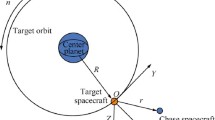Abstract
This paper has proposed a discrete gain scheduling output tracking control method for the homing phase of the spacecraft rendezvous based on the parametric Lyapunov equation. Considering the actuator saturation, output tracking and the partial loss of thruster effectiveness, we establish a relative dynamic model based on C-W equation and transform the orbital transfer control problem into a stabilization problem. The proposed gain scheduling approach is to improve the state convergence rate by increasing the introduced parameters gradually and remove the affect of the partial loss of thruster effectiveness. To obtain the designed controller, we only need to solve a nonlinear equation. Numerical simulations illustrate the usefulness and effectiveness of the proposed method.
Similar content being viewed by others
References
M. E. Polites, “Technology of automated rendezvous and capture in space,” Journal of Spacecraft and Rockets, vol. 36, no. 2, pp. 280–291, March 1999. [click]
W. H. Clohessy and R. S. Wiltshire, “Terminal guidance system for satellite rendezvous,” Journal of the Aeronautical Sciences, vol. 27, no. 9, pp. 653–658, 1960. [click]
B. Zhou, G. R. Duan, “Lyapunov differential equation approach to elliptical orbital rendezvous with constrained controls,” Journal of Guidance, Control, and Dynamics, vol. 34, no. 2, pp. 345–358, March 2011.
L. Zhao and Y. M. Jia, “Decentralized adaptive attitude synchronization control for spacecraft formation using nonsingular fast terminal sliding mode,” Nonlinear Dynamics, vol. 78, no. 4, pp. 2779–2794, December 2014. [click]
Y. K. Ma and H. H. B. Ji, “Robust control for spacecraft rendezvous with disturbances and input saturation,” International Journal of Control, Automation and Systems, vol. 13, no. 2, pp. 353–360, April 2015. [click]
L. Singh, S. Bortolami, and L. Page, “Optimal guidance and thruster control in orbital approach and rendezvous for docking using model predictive control,” AIAA Guidance, Navigation, and Control Conference, AIAA 2010-7754, August 2010.
R. Epenoy, “Fuel optimization for continuous-thrust orbital rendezvous with collision avoidance constraint,” Journal of Guidance Control and Dynamics, vol. 34, no. 2, pp. 493–503, March 2011. [click]
L. Zhao, Z. W. Li, H. J. Yang, and Z. X. Liu, “Networked control for delta operator systems subject to actuator saturation,” International Journal of Control, Automation and Systems, vol. 12, no. 6, pp.1345–1351, December 2014. [click]
B. Zhou, “Parametric Lyapunov approach to the design of control systems with saturation nonlinearity and its applications.” Ph.D. Dissertation, Harbin Institute of Technology, China, 2010.
Q. Wang and G. Duan, “Robust global stabilization of spacecraft rendezvous system via gain scheduling,” International Journal of Automation and Computing, vol. 11, no. 4, pp. 426–433, August 2014. [click]
L. Zhao and Y. M. Jia, “Multi-objective output feedback control for autonomous spacecraft rendezvous,” Journal of the Franklin Institute, vol. 351, no. 5, pp. 2804–2821, May 2014.
L. Zhao, Y. Jia, W. Huo, and C. Chen, “Adaptive output feedback tracking control for 6 DOF spacecraft formation flying under actuator faults,” The 27th Chinese Control and Decision Conference, pp. 2303–2308, May 2015.
D. J. Leith and W. E. Leithead, “Survey of gain-scheduling analysis and design,” International Journal of Control, vol. 73, no. 11, pp. 1001–1025, July 2000.
W. J. Rugh and J. S. Shamma, “Research on gain scheduling,” Automatica, vol. 36, no. 10, pp. 1401–1425, October 2000.
R. Suarez, J. Alvarez-Ramirez, and J. Solis-Daun, “Linear systems with bounded inputs: global stabilization with eigenvalue placement,” International Journal of Robust and Nonlinear Control, vol. 7, no. 9, pp.835–845, 1997. [click]
A. Megretski, “Output feedback stabilization with saturated control,” In Proceedings of the 13th IFAC World Congress, pp. 435–440, 1996.
A. R. Teel, “Linear systems with input nonlinearities: Global stabilization by scheduling a family of H ∞-type controllers,” International Journal of Robust and Nonlinear Control, vol. 5, no. 5, pp. 399–411, 1995. [click]
B. Zhou, Z. Lin, and G. Duan, “Robust global stabilization of linear systems with input saturation via gain scheduling,” International Journal of Robust and Nonlinear Control, vol. 20, no. 4, pp. 424–447, March 2010. [click]
G. F. Wredenhagen and P. R. Belanger, “Piecewise-linear LQ control for systems with input constraints,” Automatica, vol. 30, no. 3, pp. 403–416, March 1994. [click]
T. E. Carter, “State transition matrices for terminal rendezvous studies: Brief survey and new example,” AIAA Journal of Guidance, Control, and Dynamics, vol. 21, no. 1, pp.148–155, 1998. [click]
G. Duan, Linear System Theory, Harbin Institute of Technology Press, Harbin, 2004.
B. Zhou, G. Duan, and Z. Lin, “A parametric Lyapunov equation approach to the design of low gain feedback,” IEEE Transactions on Automatic Control, vol. 53, no. 6, pp. 1548–1554, August 2008. [click]
J. C. Doyle, K. Glover, P. P. Khargonekar, and B. A. Francis, “State-space solutions to standard H 2 and H ∞ control problems,” IEEE Transactions on Automatic Control, vol. 34, no. 8, pp.831–847, 1989. [click]
Author information
Authors and Affiliations
Corresponding author
Additional information
Recommended by Associate Editor Chang Kyung Ryoo in the direction of Editor Duk-Sun Shim. This work was supported in part by the National Natural Science Foundation of China under Grant 61503105, the Zhejiang Provincial Natural Science Foundation of China under Grant LY18F030005, the Open Research Project of the State Key Laboratory of Industrial Control Technology under Grant ICT170309, the National Basic Research Program of China (National 973 Program) under Grant 2012CB821204, the National Natural Science Major Foundation of Research Instrumentation of China under Grant 61427808 and the National Natural Science Key Foundation of China under Grant 61333009.
Qian Wang received her Ph.D. degree from Harbin Institute of Technology in 2014. Now she is a lecturer in Hangzhou Dianzi University. Her research interests include gain scheduling control, nonlinear system, constraint control.
Anke Xue received his Ph.D. degree from Zhejiang University in 1997. Now he is a professor in Hangzhou Dianzi University. His research interests include robust control, intelligent control and singular system control.
Rights and permissions
About this article
Cite this article
Wang, Q., Xue, A. Reliable Gain Scheduling Output Tracking Control for Spacecraft Rendezvous. Int. J. Control Autom. Syst. 16, 234–242 (2018). https://doi.org/10.1007/s12555-016-0678-2
Received:
Revised:
Accepted:
Published:
Issue Date:
DOI: https://doi.org/10.1007/s12555-016-0678-2




